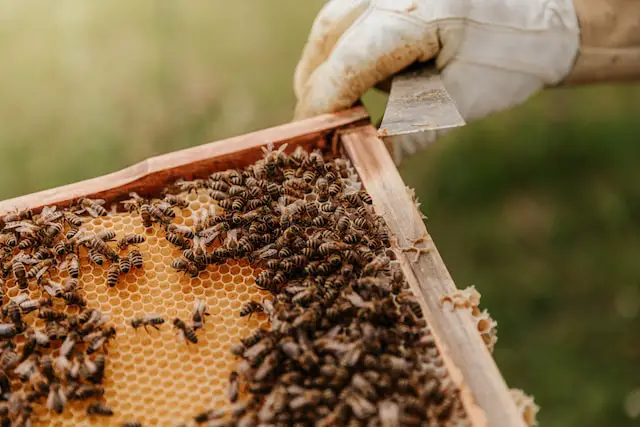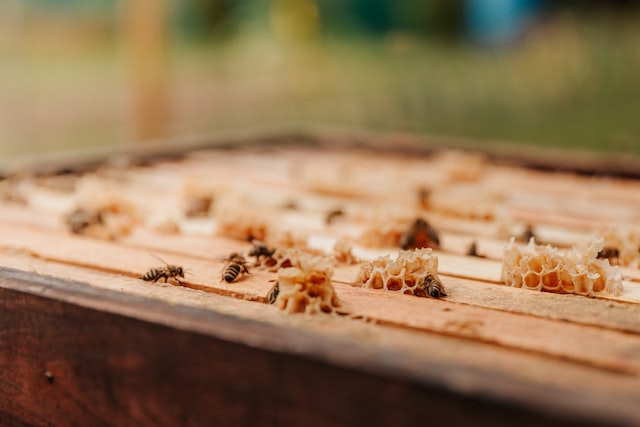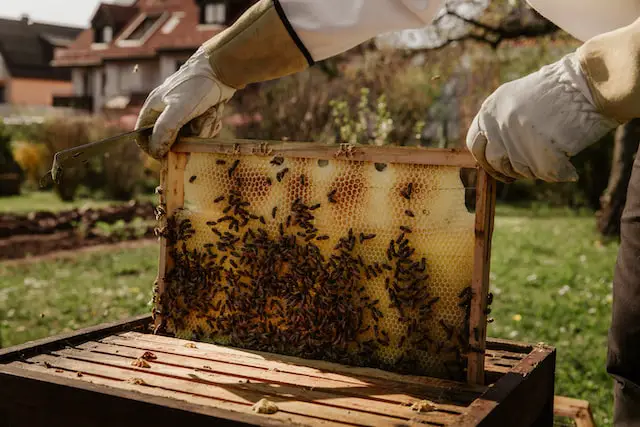While bees are not the only pollinators around, they are an extremely important one, with some estimates indicating that over a third of all agricultural products grow due to the work done by the little yellow-and-black insects. For the average person, though, bees are simply a stinging critter to be avoided, squashed and feared. In reality, bees are gentle creatures that can serve as a wonderful addition to any farm or garden plot—including those in urban areas.
Beekeeper Richard Underhill, former operator of Peace Bee Farm, has experienced the joy of keeping hives both as a production beekeeper with around 100 hives and as a backyard beekeeper with a much more modest set up of two hives. “By having bees in the urban areas, the main thing we’re doing is we’re not only supplying bees for pollination, but we’re keeping an active group of people who are knowledgeable about bees,” he says. “Keeping bees also helps fill a niche that might otherwise be filled by more aggressive insect species like wasps, hornets or yellow jackets.”

Despite his retirement from commercial beekeeping, Richard still maintains an active role in training and encouraging the next generation of beekeepers. “We need more bees—and we need more beekeepers,” he says with a well-founded sense of urgency in his voice.
In recent years, bees have made the news due to an extremely disturbing—and not entirely understood—phenomenon known as Colony Collapse Disorder (CCD). Hives affected by CCD lose the majority of their worker bees, leaving just a queen and immature bees. The result is nearly always the complete loss of the colony. While such instances of colony collapse have been recorded throughout history, a significant rise in instances of CCD since 2006 has become one of the top agricultural concerns in the United States. More hives kept in diverse locations could serve as one tool to combat CCD.
So what does someone need to do to start keeping bees? According to Richard, there are a few simple rules that urban beekeepers should keep in mind: “In urban areas, it’s important to place bees where they won’t be in contact with neighbors, passersby or pets,” he says. “That means no hives near sidewalks.” Richard also recommends placing hives near a fence if possible in order to force your bees to fly higher—something that gets them soaring well over a person’s head.
Richard also stresses that a steady supply of water is a must. “Bees consume a lot of water,” he says. This can be challenging during hot, dry Arkansas summers.
How many hives should a novice beekeeper start with? John Smith with Central Beekeeping Supply in Russellville recommends two. “Starting with two hives allows you to compare the health of one hive to the other. The hives can also offer resources for one another.”
Beekeeper Richard Underhill concurs: “Two is a good number to have in a small area,” he says. “If you have a quarter acre or more, then maybe four.”

Potential beekeepers don’t have to learn everything on their own, though. Richard teaches classes at Bemis Honey Bee Farm in Little Rock. “Our last bee day at Bemis, we had around 550 colonies,” he says. These classes are conducted in coordination with Arkansas State University’s satellite campus in Beebe. Classes are also conducted by beekeeping supply stores like Apiary Beekeeping Supply in Crossett, as well as statewide by the University of Arkansas at Little Rock’s agriculture department.
For Richard Underhill, the pleasure of watching bees buzzing to and fro is a mesmerizing form of entertainment. “I can spend hours just watching them fly from my back porch,” he says. As for the flavor of that urban honey, he sums it up thus: “It’s delicious and healthful. You’re eating a mixture of everyone’s garden flowers, wildflowers and clover—a wide variety of plants. The honey is just as good in city as it is in the country.”
For more information about Richard Underhill’s bee education efforts, visit peacebeefarm.blogspot.com.
LOCAL BEEKEEPING SHOPS

Looking to get a hive or two started for yourself? These Arkansas beekeeping supply shops can not only get you the gear you need—they can also serve as vital resources for learning the tricks of the trade.
CENTRAL BEEKEEPERS SUPPLY
1550 Ball Hill Rd., Russellville
479-968-4044
centralbeekeeperssupply.com
SOUTHWEST ARKANSAS BEEKEEPING SUPPLIES
109 Washington St., Fulton
870-896-2200
swarbeesupplies.com
APIARY BEEKEEPING SUPPLIES
207 Fairview Rd., Crossett
870-305-1125
apiarybeekeepingsupplies.com
PREPPER BEE SUPPLY
19205 Hwy. 62, Garfield
479-426-7172
prepperbeesupply.com
